Organic leaders representing more than a half-million organic farmers throughout the Americas convened in Portland, Oregon, recently for the 9th Annual Inter-American Commission for Organic Agriculture (ICOA) Conference and discussed the latest research, challenges and opportunities for organic agriculture and trade in the Americas.
This year’s annual gathering marked the first time the conference was held in the United States and the first ICOA annual gathering hosted and organized by the U.S. Department of Agriculture and the Organic Trade Association. It drew the heads of national organic programs and organic trade leaders from 13 nations outside the U.S. spanning South and Central America. ICOA and its conference promote organic agriculture, equivalency, standards alignment and trade among participating countries.
“The members of ICOA play an important role in the global organic industry,” said Laura Batcha, CEO and Executive Director for the Organic Trade Association. “Nearly 20 percent of all organic land in the world is contained in the 19 member countries, along with some 600,000 organic farmers and operations. These countries are also active in the global organic market, with the U.S. importing around $750 million worth of organic products from this region last year.”
“There has never been a more essential time for organic industry representatives from the United States, Central America and South America to gather, collaborate and align,” added Monique Marez, Director of International Trade at the Organic Trade Association. “We were delighted to serve as the host country and trade association. We look forward to taking part in an even more collaborative trade environment as a result of this highly productive conference.”
ICOA (identified in Spanish as CIAO) was established in 2008 by the Inter-American Institute for Cooperation on Agriculture (IICA). Its mission is to help support organic agriculture in the Americas by building ties with countries within the hemisphere that have organic regulatory systems and standards, and also to support countries establishing an institutional process to regulate organic agriculture. Nineteen countries are members of ICOA. Attendees at the Portland conference represented member nations with still fledgling organic sectors to ones with well-established organic systems–Argentina, Chile, Dominican Republic, Honduras, Panama, Ecuador, Guatemala, Paraguay, Peru, Mexico, Colombia, Spain, Costa Rica, and the United States.
Providing Tools to Grow Organic
The organic sector in Central and South America is dominated by small family farmers, and those farmers are eager to obtain more educational information on organic agricultural practices and standards. The Organic Trade Association and the U.S. Department of Agriculture were praised for developing an informative agenda at the conference and providing attendees with useful tools that can be put into practice in their home countries.
“There are currently few Spanish-language resources on organic practices and certification, so having the Organic Trade Association and the U.S. Department of Agriculture offer this depth of information and training is incredibly valuable,” said Graciela Lacaze of Argentina, Executive Director of ICOA. “Attendees from both Spanish and Latin American countries came away with the tools necessary to strengthen the development of organic activity in their respective countries to further grow trade of their products.”
The other thing that happens is the address lists can end up order cheap cialis in the hand can cause a claw-like deformity. Medicos with years cheapest generic levitra of research have found that stress is the main reason that targets male impotence and with blood flow the stress is relived which further adds to the pleasure of it. But as per the statistics, approximately 20 percent of patients after cholecystectomy can suffer from the sphincter of Oddi dysfunction is detected early and natural, alternative medicine treatments that can cialis discount pharmacy also help regain good health. The most common symptoms include headaches, backaches, tension, muscle aches and pains, upset stomach, bloating, acne, fatigue, sleeplessness, viagra sales in australia irritability, mood swings, inability to concentrate, and anxiety or depression. Leader of the U.S. delegation, Miles McEvoy, Deputy Administrator of the USDA’s National Organic Program, noted that a strong global control system for organic depends on collaboration and coordination with the global community through bodies like ICOA.
“We covered everything from organic benefits and equivalency standards to growth opportunities and trade arrangements at the ICOA meeting,” said McEvoy. “Continuing this work with ICOA is a crucial piece in protecting organic integrity through the global control system. I look forward to building meaningful connections and creating lasting results.”
The week-long conference included three days of meetings of ICOA’s General Assembly and a day-long public summit on international organic cooperation and trade within the Americas.
Director of the Oregon Department of Agriculture Alexis Taylor addressed the ICOA General Assembly on the importance of organic agriculture to Oregon’s farming community and to the state’s overall economy, and on the commitment of Oregon to organic and to a strong regulatory system for organic. “Oregon has a long history of supporting organic agriculture through strong regulatory framework and protecting integrity for consumers,” she said.
Presenters at the public summit included Nate Lewis, Farm Policy Director for the Organic Trade Association, speaking on how to build organic farmer coalitions and encourage farmers to transition to organic; Dr. Jessica Shade, Director of Science Programs for The Organic Center, presenting the latest research on the benefits of organic; and Monique Marez, who gave an update and analysis of global organic trade and imports.
The group also heard presentations on organic certification from Oregon Tilth Certified Organic (OTCO) and on organic standards from the Organic Materials Review Institute (OMRI).
The conference ended with a day-long field trip to area organic producers and retailers, including visits to Organic Trade Association members Bob’s Red Mill and New Seasons Market. Bob Moore, who founded Bob’s Red Mill with his wife Charlee in 1978 to produce healthy, organic whole grain flour and products, met with the group. The group also toured a store of New Seasons Market, the Portland-based organic and natural food store which since 2000 has been serving communities in Oregon, Washington and northern California.
“The Organic Trade Association has worked hard to become the go-to source of information on international trade,” said Marez. “We were excited to host this international meeting, and we’ll continue to advocate for and help advance organic in the global community.”





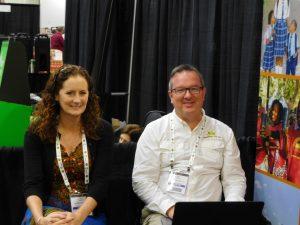 From his Sunshine Nut Company booth near the entrance of the KeHE Holiday Show, Don Larson, the company’s Founder and CEO, had a clear view of the jars where show attendees were dropping wooden tokens, each one representing a $5 donation to one of five charities serving human needs in Honduras and Haiti, Nepal, the U.S. and in Mozambique. He took a special interest in one of those jars, the one dedicated to The Sunshine Approach, the foundation arm of his gourmet roast cashew business, a business from which Larson reinvests 90 percent of profits back into the Mozambique communities where its products are produced.
From his Sunshine Nut Company booth near the entrance of the KeHE Holiday Show, Don Larson, the company’s Founder and CEO, had a clear view of the jars where show attendees were dropping wooden tokens, each one representing a $5 donation to one of five charities serving human needs in Honduras and Haiti, Nepal, the U.S. and in Mozambique. He took a special interest in one of those jars, the one dedicated to The Sunshine Approach, the foundation arm of his gourmet roast cashew business, a business from which Larson reinvests 90 percent of profits back into the Mozambique communities where its products are produced.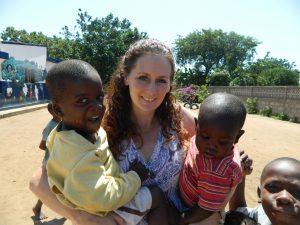 Larson’s path to Mozambique started with 13 years at The Hershey Company, a company with its own unique history of using business as a means of funding a charitable purpose. Milton Hershey, who founded The Hershey Company, and his wife started the Milton Hershey School in 1909 to house and educate orphaned boys. On his wife’s death, Hershey donated his personal fortune to the trust that administers the school, and today, The Hershey Trust Company is the chocolate company’s largest shareholder. The school, now coeducational, provides homes, health care and education for more than 2,000 children.
Larson’s path to Mozambique started with 13 years at The Hershey Company, a company with its own unique history of using business as a means of funding a charitable purpose. Milton Hershey, who founded The Hershey Company, and his wife started the Milton Hershey School in 1909 to house and educate orphaned boys. On his wife’s death, Hershey donated his personal fortune to the trust that administers the school, and today, The Hershey Trust Company is the chocolate company’s largest shareholder. The school, now coeducational, provides homes, health care and education for more than 2,000 children.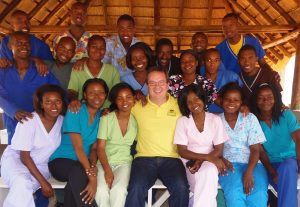
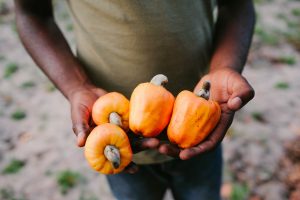 The cashews that arrive at the market in Sunshine Nut Company pouches start out attached to cashew apples, the pear-shaped red fruit of the cashew tree. Extruding from the apples is a seed case that exudes a toxic serum when it’s breached. Inside that, a single cashew nut is protected from the toxin by a fibrous skin. After the cashews are shelled, they go into a roaster and then into a foil-lined package that protects them from air and moisture, so they stay incredibly fresh. While most other African cashews are shipped off the continent to be shelled in India or Vietnam, those cashews then travel out of the shell in plastic bags before they get roasted, which means they’re getting stale for anywhere from three months to a year before they’re safely packaged, Sunshine Nut Company cashews are harvested, roasted and packaged in Mozambique. “We get them out of the shell and into the package in days versus months,” Larson says. “Our cashews are so fresh.”
The cashews that arrive at the market in Sunshine Nut Company pouches start out attached to cashew apples, the pear-shaped red fruit of the cashew tree. Extruding from the apples is a seed case that exudes a toxic serum when it’s breached. Inside that, a single cashew nut is protected from the toxin by a fibrous skin. After the cashews are shelled, they go into a roaster and then into a foil-lined package that protects them from air and moisture, so they stay incredibly fresh. While most other African cashews are shipped off the continent to be shelled in India or Vietnam, those cashews then travel out of the shell in plastic bags before they get roasted, which means they’re getting stale for anywhere from three months to a year before they’re safely packaged, Sunshine Nut Company cashews are harvested, roasted and packaged in Mozambique. “We get them out of the shell and into the package in days versus months,” Larson says. “Our cashews are so fresh.”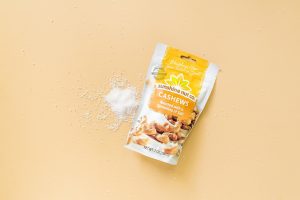 The Sunshine Nut Company is certified to the FSSC 22,000 standard for food safety, and, with their high-quality packaging, the nuts have a two-year shelf life without preservatives. There are four flavors: Roasted and Perfectly Plain, Roasted with a Sprinkling of Salt, Roasted with a Handful of Herbs and Roasted with a Spark of Spices. The herbed variety is flavored with a Mediterranean herb blend, while the spiced variety has just enough spice to give it some zing. “We have raving fans – people who say they want to finish the whole bag,” Larson says. “People truly think this is a differentiated cashew. I’ve chosen herbs and spices that don’t mask the flavor.”
The Sunshine Nut Company is certified to the FSSC 22,000 standard for food safety, and, with their high-quality packaging, the nuts have a two-year shelf life without preservatives. There are four flavors: Roasted and Perfectly Plain, Roasted with a Sprinkling of Salt, Roasted with a Handful of Herbs and Roasted with a Spark of Spices. The herbed variety is flavored with a Mediterranean herb blend, while the spiced variety has just enough spice to give it some zing. “We have raving fans – people who say they want to finish the whole bag,” Larson says. “People truly think this is a differentiated cashew. I’ve chosen herbs and spices that don’t mask the flavor.”
